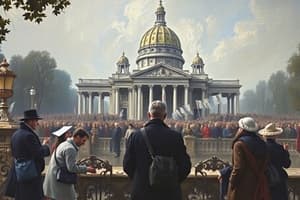Podcast
Questions and Answers
What defines an aristocracy in government?
What defines an aristocracy in government?
- Power held by a small, privileged ruling class (correct)
- Rule by a single leader selected by the populace
- Governance through direct participation of all citizens
- Majority rule through elected representatives
Which of the following best describes representative democracy?
Which of the following best describes representative democracy?
- Citizens elect representatives to govern on their behalf (correct)
- Citizens vote on every issue directly
- Government power is inherited through family lineage
- Voting occurs only during scheduled referendums
What characterizes an oligarchy?
What characterizes an oligarchy?
- Direct governance by all qualified citizens
- Power held by elected officials representing the majority
- Ruling power vested in the monarch's family
- Governance exercised by a wealthy group (correct)
Which type of monarchy is based on a predetermined rule of succession?
Which type of monarchy is based on a predetermined rule of succession?
How is power structured in a parliamentary government?
How is power structured in a parliamentary government?
What distinguishes a presidential government from a parliamentary government?
What distinguishes a presidential government from a parliamentary government?
Which government system allows citizens to vote on issues individually?
Which government system allows citizens to vote on issues individually?
What is a key feature of an elective monarchy?
What is a key feature of an elective monarchy?
What defines a government in a political system?
What defines a government in a political system?
Which term best describes the action of governing in various sectors, not limited to government?
Which term best describes the action of governing in various sectors, not limited to government?
What is a key principle of good governance as emphasized in the lecture?
What is a key principle of good governance as emphasized in the lecture?
Which body is recognized as the primary actor that leads in governance?
Which body is recognized as the primary actor that leads in governance?
Which component of governance refers to organizations that advocate for specific societal causes?
Which component of governance refers to organizations that advocate for specific societal causes?
What authority does the local government derive from according to the content?
What authority does the local government derive from according to the content?
What role do private corporations play in governance?
What role do private corporations play in governance?
Which of the following best describes governance?
Which of the following best describes governance?
Flashcards are hidden until you start studying
Study Notes
Leaders of Government
- Governance typically rests with the President or Prime Minister.
A Government of the "Few"
- Aristocracy: Power held by a small, privileged ruling class. The term originates from Greek "aristokratia", meaning "rule of the best".
- Oligarchy: Governance by a small group, often wealthy elites. This system can exploit the poor and marginalized, reflecting despotic tendencies for selfish gains.
A Government of the "Many"
- Democracy: A system governed by the people, defined by Abraham Lincoln as "government of the people, by the people, and for the people". Power is vested in the majority.
- Direct Democracy: Citizens vote directly on issues; no modern nation operates solely on this model.
- Representative Democracy: Citizens elect representatives to create laws and manage governance, seen as the most efficient method to uphold individual rights.
Source of Power
- Hereditary Monarchy: Monarchies designate succession based on predetermined rules, established by constitutions or parliamentary acts, or familial lines.
- Elective Monarchy: Rulers are elected through popular vote.
Political Structure
- Parliamentary Government: The cabinet is accountable to the legislature, particularly the popular chamber, reflecting immediate responsibility to the electorate. The Prime Minister leads and is part of the majority party.
- Presidential Government/Republican: This system features a President with constitutional independence from the legislature, unlike parliamentary models. The Philippines operates under a Presidential Government.
Legality or Constitutionality
- No specific details provided, but legality and constitutionality are fundamental aspects of governance structures.
Government
- A formal organization with the authority to make political decisions within a specific system.
- Serves as the primary vehicle for governance, acting as an agency for change and mobilization.
Governance
- Broadly defined as the exercise of authoritative direction or control over a political unit or organization.
- Encompasses all processes of governance, including those by governments, markets, and networks, over various entities such as families and organizations.
- Involves the management of economic and social resources, highlighting how power is exercised.
- Good governance emphasizes accountability, based on the principle "Public office is public trust."
- The World Bank offers a comprehensive approach to understanding governance.
Domains of Governance
-
The State
- Acts as the principal actor in governance and leads in government operations.
-
Local Government
- Comprises provincial, municipal, city, and barangay levels, deriving authority from the 1987 Constitution and the Local Government Code of 1991.
- Responsible for administering localities as defined by law.
-
Private Corporations and Business Organizations
- Regarded as crucial for governance, they provide financial resources through donations, grants, or loans for community projects.
-
Civil Society
- Represents organizations advocating for various causes, often considered the "third sector" as they are frequently overlooked or neglected in governance discussions.
Studying That Suits You
Use AI to generate personalized quizzes and flashcards to suit your learning preferences.




